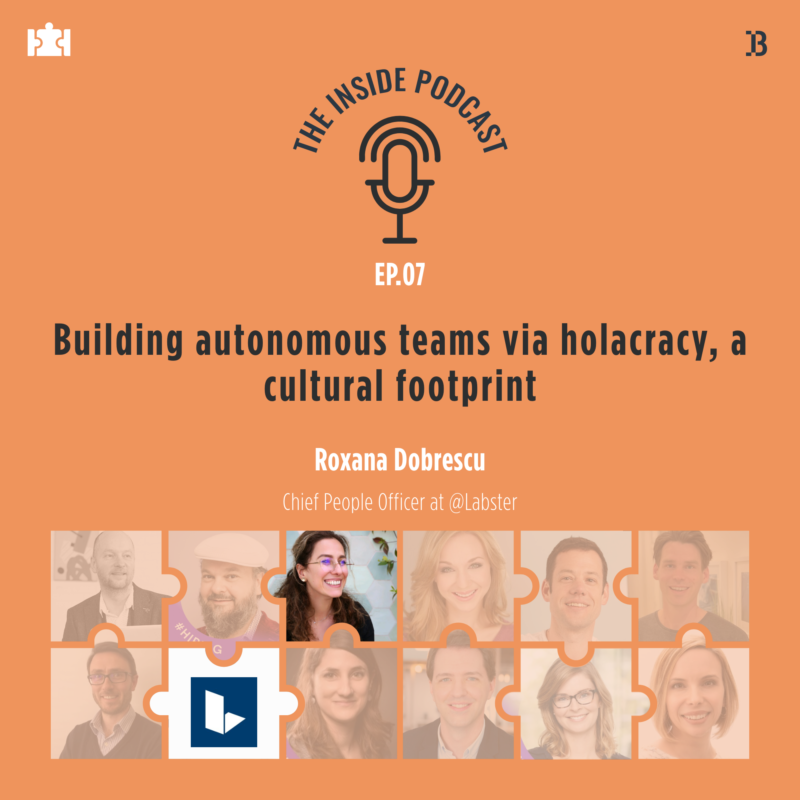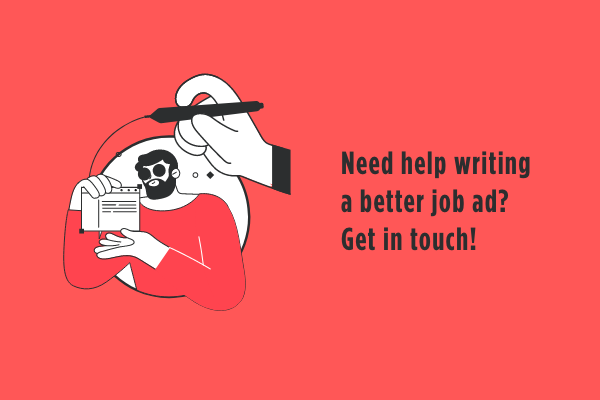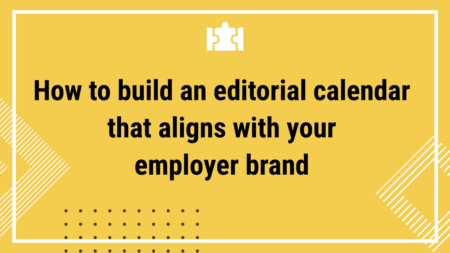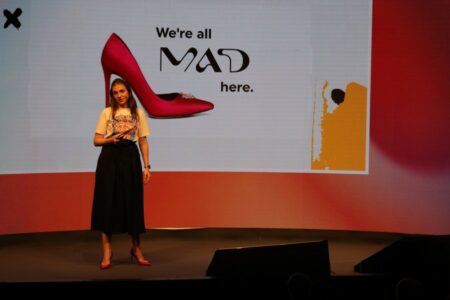Overview
Tune in for Ep.7 of Employer Branding: The Inside Podcast, Season 4!
In this episode, we had the pleasure of speaking with Roxana Dobrescu, Chief People Officer at Labster. We talked about the importance of diversity & inclusion in strengthening company culture, maintaining a vibrant work environment when working from home, but also about holacracy, a cultural footprint that helps build truly autonomous teams. Enjoy!
What you’ll learn by listening
- The importance of diversity & inclusion in strengthening company culture
- Leadership involvement in shaping company culture
- Working remotely: making things work across different countries & continents
- Guidelines for maintaining a vibrant work environment when working from home
- An overview of holacracy, a cultural footprint
- Trust & flexibility at work: building resilience to succeed
About the company
Labster is a fast-moving, award-winning company that focuses on revolutionizing the way science is taught to students all over the world. Virtual labs are simulated learning environments that allow students to complete laboratory experiments online and explore abstract concepts and difficult theories without stepping into a physical science lab.
Podcast link – Enjoy listening to The Inside Podcast, S04Ep.7!
Podcast transcription
Georgiana: Hello, everyone! This is Georgiana with a new episode of Employer Branding: The Inside Podcast. Today I’m talking to someone who’s really really special. All of my guests are special, of course, but this one in particular, because I think she has a ton of experience working with people. So I’m sure she will be sharing a lot of useful, important insights today. Her name is Roxana Dobrescu, and she works as Chief People Officer at Labster in Valencia, Spain. Welcome, Roxana! Thank you so much for accepting my invitation. Please tell me a little bit about what the company you work for does and share with us your background because I know you’ve worked a lot with people.
Roxana Dobrescu: Hi, Georgiana! Thank you so much for the invite. I am blushing obviously. Because I am on this amazing learning curve as we speak right now. Let me share a bit about who I am so that you know where to take me from. I am born and raised in Romania, I had the opportunity to work with amazing international companies like Xerox, MolsonCoors, and Avon, where basically I’ve learned my school in HR. I would be able to say it was definitely there. Avon has a special place in my heart.
Moving forward, a couple of good years ago, my dear mentor told me ‘Hey, do you want to be that sort of global HR professional that we are discussing here and I’m preparing you for.’ Guess what? You need to make a leap of faith and just move on. And understand what diversity means; how amazing the global mindset and the global spirit are. And you will be able to do that only when you are pushing your comfort limits. So I did that. I lived a couple of years in Mauritius, where I worked for Aspen, an amazing pharma company. And after that, I moved to Spain, to Barcelona where I worked for Glovo. And here I am, for one year in one month already. Moving to Valencia, where I set up a tech hub for Labster.
The company where I’m having a blast right now working and leading the people agenda for Labster is a special company because it has a special mission. So we’re waking up every day and putting our best out there to make sure that we first democratize education for students and people all across the globe that might not necessarily have the right tools or access to education. And second, we do this in order to empower the next generation of scientists. So our mission is clear. We are building virtual laboratories. More than 200 STEM curriculum-aligned laboratories in biology, biochemistry, genetics, biotechnology, chemistry, physics, and way more in order to make sure that our current students will become the next generation of scientists that will actually solve the main problems that we’re facing today.
Georgiana: And I think I saw that you received a lot of investment this year. Am I correct? Like $47 million?
Roxana Dobrescu: Last year? No, it’s like this month actually. We did close another round of $47 million. And we are very happy because this will give us, even more, boost in us spreading globally and scaling our journey, and making sure that we are one step closer to our mission.
Georgiana: And I’m really curious Roxana, I asked this question to many of my guests because it’s one of those concepts that’s become fashionable, unfortunately, and that not all companies really take seriously. I will dedicate a few episodes to this one in particular in the months to come. And that is diversity and inclusion. I’m really curious, you mentioned it as part of your personal journey, right? Meeting diversity in working with it and within it. And I’m wondering how Labster sees it and how important is it for your company, again, to strengthen the culture?
Roxana Dobrescu: I think it’s key. And we look at it as a must-have in our strategic roadmap. In my experience, Labster is the first scale-up where I’m working for. And you need to have the base, the correct base built-in first. And by base, I mean you need to have first the proper leadership philosophy in mind, you need to have the framework in your people practices so that you can welcome and build forward, your diversity and your inclusion practices. I think it’s so interesting because we were just having a discussion in the people team around it. And we have an off-site scheduled in early May, where diversity and inclusion will have a special topic obviously. We have our lobsters as we call them, on three different continents.
And when you look at the diversity in terms of cultural sensitiveness, and you look at the religion and gender and ethnicity and the family categories, it’s absolutely amazing to be able to map and work and customize our people process processes and practices. So they make sense for all the multiple categories that we have with it. That being said, it’s easier to speak about it versus actually implementing it. So what we are doing right now, we are starting to work with compensation, making sure that from a gender perspective, the gender gap, it’s something that we can see and work to correct.
And I’m really happy because we just shared the first column and gender data with our teams. Moving forward, we are really focusing on ERGs. So making sure that we are welcoming and supporting and bringing awareness to how to build Employee Resource Groups. Because in this scale-up journey, while we are improving continuously our pupil practices, we want to make sure that we are continuously taking feedback from our internal clients. That’s why we do need the ERS.
We need to understand micro-communities that are forming part of Labster, how and what they are expecting so that we understand how to customize better our processes to their needs. So this is where we are really focusing on this year to make sure that the awareness is fully built. And we have the proper tools for our talent acquisition, which was already part of last year’s people roadmap. This year we are really focusing on building ERGs.
By the way, in terms of diversity and inclusion, last year we had a really cool project that I loved. It was around the fact that we are recruiting with culture ad, right? We welcome a multiple diversity of people with various backgrounds and values that would complement what we have right now. And it was an interesting exercise to go through. Also with our talent acquisition team to really distill what culture add means. What scorecards can we put in place so that we capture that culture add, what sort of questions hiring managers should ask themselves in order to understand Hey, am I here? Like, am I fully conscious of my biases here? Do I know exactly that this hiring decision that I’m taking is in favor of raising the bar in the team and making sure that diversity and full inclusion is kicking in here. So yeah, we are at the beginning of the roadmap trying to listen to our people and trying to understand that we cannot do this by ourselves. It’s equally a bottom-up trying altogether to work for the same objective.
Georgiana: And I’m curious about leadership involvement in shaping company culture. Would you say it matters to a super high degree and then, as a leader yourself, how involved are you personally in getting to know the people and understand them closely?
Roxana Dobrescu: Leadership philosophy, it’s the backbone. Absolutely. And again, it’s funny that you’re touching on this topic because there’s another project that is very keen and close to my heart. We are working on it right now. Just because if you look at Labster’s journey, you can see different chapters in our scaling adventure. And for each chapter we need specific and very different, I would say leadership capabilities and leadership philosophies.
And we realized last year that we are at this border right now where we need to take a step back and really ask ourselves, is it still making sense? It’s like the generation of lobsters, the roadmap, the next three years’ strategy? How are we going to put it in place with the current leadership capabilities? So we did that exercise. And now we have a new, a new project mapping. I would say upgraded leadership capabilities that we are like right now building from within and sharing it with everyone. But how leaders are behaving, that’s the mirror of the organization, how you are setting the tone, how you listen, how you react when someone feels, that’s an intrinsic part of the culture.
So what I would add, is that funny enough, in the startup world, leadership is always, or in most cases, not the priority. Why? Because you have a lot of adrenaline, you have a lot of goals that you need to hit, you might be successful or not, and you might grow your roadmap or not from year to year. So it’s not something that it’s clearly mapped out for the next years. So we find ourselves chasing the results, working on our OKRs. And not necessarily promoting from within right leaders that are really young. And you never have the time to take the leaders for one week program or you know, to put specific coaching support or program in there. And that’s why you end up in like mature scale-ups, I would say, wondering Hmm, okay, how do we do this?
How do we turn around from a leadership capability perspective, so that we actually can inspire and empower our workforce? I think we had this exercise two or three years ago when we really try to understand, right, what got us here. What can we do in order to move ahead, it was clear that it was around the leadership philosophy, and about the sense of belonging. That’s your second question about how close I am to the team. I’m trying to be extremely close. First, we are lucky because we have amazing people that care a lot. We are quite a green company.
Caring is part of how we do things. But also we are having a great people partnering model, which means that every team has its own people partner to support and nurture and care for, and develop. That being said, it’s never enough, right? Because we have people in 47 countries and in different time zones. Just like to give you an example, I woke up, and I’m discussing with my our colleagues in Indonesia, and usually in the middle of the day, and discussing with our colleagues in Europe, and I end up the day, like when the US is waking up and like trying to come up and catch up with with our colleagues from the other continent.
So is it an easy task? No, I don’t think so. How I am trying to approach it is by being extremely authentic across all the platforms and channels anytime when you’re like I have the opportunity to present what we’re doing so that people can start bonding and can see that hey, we are here for you. And basically, if you’re successful it means we are successful, and you should definitely use us as a coach, as a tool, as a channel to make sure that your voice is being heard.
Georgiana: You know, Roxana, you sort of answered my next question, but I’m still curious to know how you guys work? Is it remotely, hybrid, or do you meet part of the team at the office? How does it happen?
Roxana Dobrescu: Things have changed so much in the last three years. It’s pretty unbelievable. We have offices in Switzerland, in Denmark, in Boston, in Canada, now in Spain, and in the UK it’s coming. And in Bali. And it’s very interesting because when I’m looking at our work style, it’s 80-85%, remote, fully remote. So there are very few colleagues that are coming into the office from time to time. Not to mention that we have, around 40% of our colleagues that are not even located where we have offices, so we have country colleagues in Pakistan or in the Philippines, or Ukraine where we don’t have a physical office. So 85% of our workforce is highly remote.
That being said, we are right now in this, you know, the internal debate around Hey, is it working for us? Do we want to continue this highly remote style, do we want to become a bit more hybrid, because obviously, we kept our offices open. And we understand that not everyone is a super keen fan of working from home. And we can see that, for example, in Boston, or in Copenhagen, people are starting to come back to the office more and more often. And we reintroduced some of his benefits and perks and started to have some office events, and it’s great. So I’m seeing already a trend that is coming from our people was what we have you like very much ingrained in our values is flexibility. And that’s why we are not pushing people to come back. But we are trying to make our offices as fun and as collaborative as possible. So they want to come back. Yeah, this dilemma will continue in the next couple of weeks, until we will realize how much we need to support the hybrid workstyle.
Georgiana: Now, the two following questions I have are sort of connected to one another. What does the working environment look like in the company? Because you said you’re a very people-driven culture. However, you work remotely. So I’m curious, how do you preserve and how do you create a working environment that’s vibrant when you work from home? And then how are the leadership and the management style reflective of the company culture? So employing a leadership management style on the one hand and then working environment? How do they work?
Roxana Dobrescu: I think it’s very much linked with holacracy right? Because holacracy has a cultural footprint on how we work. And basically, holacracy is allowing us to work with a lot of autonomy and a lot of empowerment. What that means is that the rules are very clear for each and every one of us, and also the accountability and the decision-making power. That being said, I know, for example, I know exactly what are my accountabilities and where I can decide, and where I need my leaders, Michael, our CEOs, by no decision-making point.
And this is happening to literally everyone on the team. This high level of autonomy, I think it’s extremely needed, having in mind that it’s connected with our mission. We want to bring this autonomy and we want to empower all our students to make sure that they have the proper tools and know-how to be able to change their lives and change the world. So we are trying to walk the talk when it comes to our culture and our internal processes making sure that our people feel that there is no red tape. We are really trying to make sure that transparency is as high as possible.
And how do we do that? Well, we are trying to communicate a lot so internal communication is something extremely important for us. We leverage Slack a lot. I would say we use around 80% Slack as our internal communication channel. We are using a lot of asynchronous communication. We have a clear OKR process in which everyone knows their goals and how my goals are very much linked with the company’s goals for this quarter, for this year, and for the next years. I think it’s a constant effort.
And so far, it worked because our users are really ingrained and they are they really care. At the same time, it’s important to acknowledge the fact that last year like we had so many different COVID variants coming into play, and it was challenging for us because they came like when we had the delta or the Omicron. They came into place at different times like in Europe, Indonesia, in the US. So it was not like okay, we are done with Delta, let’s move on. No, no, no, because then it spread in Indonesia.
And it had a ripple effect on everything that we did. But we did decide that even though we are highly remote, it’s important for us to have a physical connection. So at least once per quarter, we are extremely intentional in meetings. We have work workshops, we have summits, we have the training, we have brainstorming, like every squad, every team has its own internal events that they are organizing. For example, we had a revenue kickoff where all the colleagues from sales, marketing, customer success, Europe, and US had an amazing event. We are organizing Tech Summit right now in Valencia, we are having the people off-site that’s happening also in ways where we are really trying to make sure that at least once per quarter, we bond and we have the time to like share best practices and have fun together, build on our trust, which, you know, it’s quite difficult to foster when you are 1000s of kilometers away.
Georgiana: Indeed, but it’s obviously working. I mean, I think if you really want to make it work, you’ll find a way. Right. As with everything.
Roxana Dobrescu: I think so. Absolutely. What I see as well is that the workforce trends are changing literally from one quarter to another. And as an HR professional, it’s challenging to say the least, to be able to support an organization in a culture through a pandemic. Well, what’s next? How can I prepare my workforce? How can I make sure that my organization will thrive? And literally not knowing what will we will have to face in the next chapter. So I think that you know, we need to build this resilience and this sense of belonging in order for us to be able to survive and succeed. And we can do that by having a lot of flexibility, but by also building a lot of trust in the team.
Georgiana: I’m wondering, this is more of an employer branding question. I’m wondering, what would you say is the best channel, the social channel for building or strengthening an employer brand? Because you’re a big organization?
Roxana Dobrescu: I think it also depends on the industry where you are working. For us, for example, we are hiring a lot of engineers. And we are hiring a lot of scientists. And we figured out quickly that, for example, Facebook or Instagram are not working, or are not as catchy or attractive, or not giving us that extra boost when it comes to employer branding. For us, LinkedIn is working quite well and is highly supportive in this adventure of building our brand awareness and building their career.
Like communicating our EVP. I think we are you know, at this point in time, we are putting all our resources into building LinkedIn as our main social media channel, but I didn’t work in other industries with other startups where Instagram had a lot, a lot of acceleration, a lot of appetite and help a lot contributing to the employer branding piece. So I think it’s important to be mindful on your target. It’s really interesting because you’re like reflecting on, and we are working in edtech. Right.
And education, although it’s supposed to be one of the most innovative industries out there, guess what, it’s one of the most traditional ones. So and that’s why we are disrupting right now. That’s where we are, you know, have a playing the role of an incubator, trying to bring a lot of innovation, like exactly like a flight simulation simulator, right, like, like our laboratories are, are more or less playing this role. And we can see that, like, our teachers, our educators are not necessarily using the common social media platforms. At the same time, as I was telling you, like, the scientists that we are we need in order to build high-level quality content might not be necessarily on the, on the social media on the commonly used social media platforms. But where we found our marketplace. It’s definitely LinkedIn.
Georgiana: Got it. I’m wondering, what’s the key secret to being such a good people officer? Is there one?
Roxana Dobrescu: Well, I’m not sure how good am I to be able to give you the seven secrets and give me some tips at least have a? Well, I’m subjective, right? I’m sorry, Jeff. I’m definitely biased. And I will tell you what, what is working for me in the last 12 months? Right? I’m so blessed to have an amazing partnership with Michael, our CEO. And there is that sort of partnership where I like every week when we are having our discussions I’m even though I’m going with hard topics in there.
I’m coming back lightly, and I’m almost flying. Because Michael is the leader who inspires a lot and who cares a lot. So yeah, definitely, this is not necessarily a secret, but it’s key, it is essential. The second piece, I would say it’s, well don’t take things personally. Because it can get lonely, right? In this sort of role, you will never be able to please everyone because everyone has different to accept expectations. And you can filter things and messages from a different perspective. So the most important thing is that you, you keep yourself humble, you listen a lot, you are trying your best you customize the privacy practices, but don’t take things to heart because then you are going in a very different and not necessarily nice path. And that easier again, like diversity and inclusion, that’s easier to say than to do.
Georgiana: Yes, I have to confirm it’s difficult in all areas, whatever you do, whatever the role if you’re an entrepreneur if you work in an organization, not taking things personally, hardest things you ever have to do. I totally agree. Now that we are reaching the end of this discussion that I really, really enjoyed, please share with us Roxana, one thing that has helped you in your career so far, it can be a professional resource, or I don’t know, discussion, group, book, blog, whatever.
Roxana Dobrescu: Oh, I have so many things, so many things. And so many people, when I’m looking back, it’s all around the people. And that’s why I think it’s so important for us even more important for us as not only that, but HR and people practitioners to give back all the time, like nonstop like to make sure that we are aware and humble enough so that we can contribute to your community. And yeah, like I have a lot of people to that I treasure and that helped me so much.
I will definitely mention someone that had most probably the biggest impact on my career. It’s the CEO of Avon that I work with, Răzvan Diraţian. who gave me that chance. And that was the most probably one of the major lessons that I’m really trying to be mindful of when you hear leaders that are like, No, he’s too young or she’s too young, no, not now. Like the risk for the business would be too high. If we would, you know, give him or her this chance, and Răzvan. He managed to sell something to me. And although I was like that point, I was 27 or 28 years old. Without any previous HR management experience, he said, like, I think you can do it, take it. And not only that give me the full mandate, not only the role, but he also gave me the mandate, and he had my back, and I will be forever grateful for taking the risk. Yes.
Georgiana: Thank you so much for this lovely discussion. I learned a lot from you, just as I assumed before we started. I wish you all the best folks and I think you have a lot to share and a lot to build in the organization. And once again, thank you for accepting to talk to us.
Roxana Dobrescu: Grateful for the discussion, Georgiana. Thank you so much for the invite.
This was Employer Branding: The Inside Podcast. You can find our podcasts on Spotify on Apple podcasts and content on employer branding-related things on employerbranding.tech. Until the next time, stay tuned.







